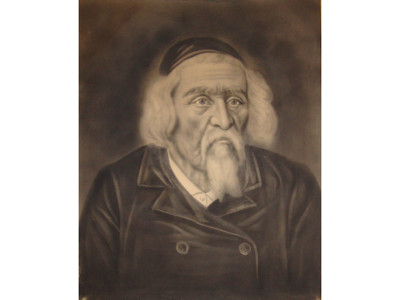
In this week’s parshah (25:35), the p'suk says, "v’chei yimach achicha – if your brother becomes impoverished – umatah yodo imach – and he is in close proximity to you – v'hczaktah – you should give him strength." Literally, the p'suk means if a person becomes impoverished, poverty-stricken, or indigent, one should uplift them – take care of them. However, my father, Rav Yitzchok Fingerer, shlita shared another interpretation in the name of the Avnei Nezer. In the midbar, desert, no one was destitute; the Jews had all they required. Additionally, the Clouds of Glory, the manna, and Miriam’s well were readily available. Hashem was with them and showering them with open expressions of Divine Love. So, what's v'hczaktah? Who necessitated strength and how was one expected to deliver on such a request; moreover, what was the purpose in such an endeavor?
Your mitzvah is not to simply to assist someone else financially, incredibly elucidates the Avnei Nezer. Your good deed is not to bring monetary comfort to an underprivileged person. Rather, your mitzvah is to be of assistance to another person at the moment they do not feel good about themselves. You will reap tremendous reward when you rise to uplift your peers when they feel disconnected from a higher presence. This is the precise time when v'hczaktah is at play. One is obligated to provide inspiration that fosters a person to reestablish a connection to their heritage and Creator. Not only is the deed profound, but the kindness also shown by being mekarev, bringing others close to Hashem, is also greatly rewarded. If you encounter a dejected individual who has distanced themselves from the Almighty, there is a unique obligation to provide chiyut, to encourage them to feel the emotions of being alive and healthy once again.
One year, a few days before chag Pesach a gentleman approached the Beis Halevi with an unusual request. The fellow desired to fulfill the mitzvah of arbah kosot (the four cups) at the Pesach seder with milk instead of wine. Surprised, the saintly rabbi questioned if this decision was based on health concerns to which the man shook his head in the negative stating that his family was thanks to the grace of Hashem in good health. Realizing the rabbi remained a tad perplexed, the yungerman explained that his choice of milk for the arbah kosot was because of a difficult financial situation. Instead of allowing the practice, the Beis Halevi forbade the use of milk, and handed a sizable sum of money to the fellow to assist in defraying the costs of the holiday.
Standing nearby, the Beis Halevi’s wife had witnessed this peculiar exchange and inquired of her husband’s decision to provide such a substantial figure considering that the cost of wine was not nearly that prohibitive. Gazing into his wife’s eyes, the Beis Halevi replied, “The Pesach meals are fleishig, meat or chicken based. The situation presented meant that this family could have only considered using milk for the arbah kosot if they could not afford to buy meat. Therefore, it was not enough for the great sage to only provide enough funds for wine as the man’s family required the means to purchase meat products to sustain themselves throughout Yom Tov! The Beis Halevi set an example by going well beyond “only helping” the person in need and providing just the wine he had mentioned, realizing his family required money for other necessities, the rav opened his pocket to fulfill that pressing need too! What astounding greatness! Let us all strive to seek out avenues to help another Jew and give each other chizuk whenever it seems proper!
Jewish n’ Joyful podcast and its videos are available on all main streaming platforms. Subscribe, sponsor a week of Parsha Knowledge, or send feedback on our newsletter packed with Torah thoughts, stories, and inspiration on the weekly parshah at This email address is being protected from spambots. You need JavaScript enabled to view it., or visit www.parshaknowledge.com.
Parshat Behar: Empowering Others
Typography
- Smaller Small Medium Big Bigger
- Default Helvetica Segoe Georgia Times
- Reading Mode




